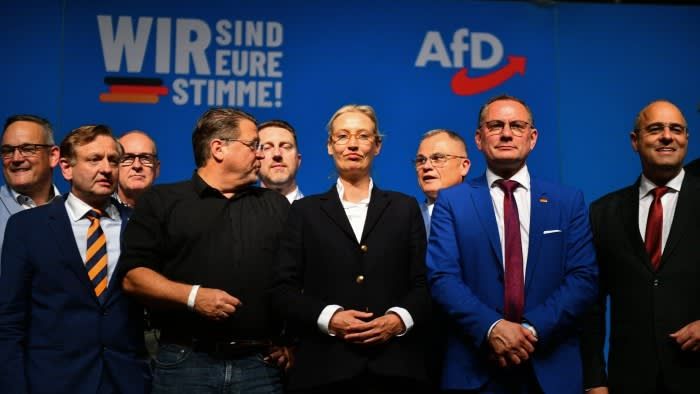Germany’s AfD hopes for far-right victory in France

Access the Editor’s Digest at no cost
Roula Khalaf, Chief Editor of the Financial Times, chooses the stories she loves the most for this weekly newsletter.

The head of the extreme right Alternative for Germany party expressed her desire for a clear win for France's Rassemblement National in the current parliamentary election, despite acknowledging the difficult task of repairing the strained relationship between the two parties.
Alice Weidel expressed her hopeful wishes for the RN to the Financial Times and believed that Jordan Bardella, their leader, had a good chance of becoming France's youngest prime minister ever.
"I believe in Bardella and the RN's capability to bring change to their nation," she expressed with certainty.
Bernd Baumann, the AfD's top leader in the Bundestag, mentioned that the RN's success demonstrated that the European right-wing movement is gaining momentum. He pointed out that leaders like Giorgia Meloni, Marine Le Pen, and the FPÖ in Austria are inspiring and confirm that they are heading in the right direction.
However, Weidel admitted that it was unlikely for the AfD and RN to resolve the disagreement that resulted in the German party being kicked out of the Identity and Democracy group (ID) in the European parliament in May due to various scandals.
Weidel mentioned that the AfD is actively seeking new allies and working on establishing their own coalition. She also emphasized that she bears no ill will towards Marine Le Pen, the parliamentary leader of the RN.
However, it is very likely that the AfD will become more isolated in Europe, especially since one of its close allies, the FPÖ, recently announced the formation of a new right-populist group called Patriots for Europe with Viktor Orbán's Fidesz and ANO from the Czech Republic.
Sources from AfD admitted that it was highly improbable for their party to be included in the new alliance.
A member of the AfD stated that Fidesz would block the AfD from joining their group because they are worried about upsetting major German businesses with investments in Hungary. However, the political landscape in the European parliament is constantly changing, leaving many opportunities for new alliances.
Weidel spoke with the FT right after being re-elected as AfD co-leader at the party's yearly meeting in the west German town of Essen this past weekend.
The gathering was greatly affected by widespread demonstrations as numerous Germans came together in Essen to show their disapproval of a political group they view as supportive of Russia, prejudiced against immigrants, and against democracy.
Even though German domestic intelligence has labeled the AfD as a potential extreme right-wing group, it remains the most successful far-right party in Germany post World War II. The party achieved a record 15.9% in the recent European elections, marking its strongest performance in a national election to date.
However, in Europe, it is becoming more and more viewed as an outcast.
The AfD has faced a string of controversies in recent months that have hurt its image in Europe and strained its connections with other extremist parties that it could naturally align with.
A few of its members were exposed towards the end of last year for talking about sending millions of immigrants back to their countries, including those who hold German citizenship. The main candidate for the European elections, Maximilian Krah, has come under scrutiny for his connections to China and Russia. Many people in Europe were shocked by his comments during an interview where he suggested that not all members of the SS were criminals. This led to the RN cutting ties with the AfD.
Weidel admitted that the SS interview was the final straw. She said, "The disappointment with our party became unbearable."
She mentioned that Krah's mistakes and issues with the law were one of the factors that contributed to the AfD not performing as strongly as expected in the European elections. Just a few months ago, the party was polling at 23 to 24 percent, surpassing all the parties in Chancellor Olaf Scholz's coalition.
During her address at the conference, she acknowledged that the campaign had been challenging. She described it as a rocky journey filled with intense disagreements.
Her co-leader Tino Chrupalla stated that moving forward, the party needs to examine its candidates more thoroughly.
During the interview, Weidel mentioned that her preferred outcome would be for the RN to exit ID and create a new group, potentially teaming up with Fidesz. This could allow the AfD to once again collaborate with the parties remaining in ID.
Nevertheless, she spoke prior to the establishment of Patriots for Europe, a change that could potentially decrease the AfD's opportunities for success.
She stated that the AfD would not join forces with other extremist parties in parliament just to be part of a group. Instead, they would rather stand alone.





















































